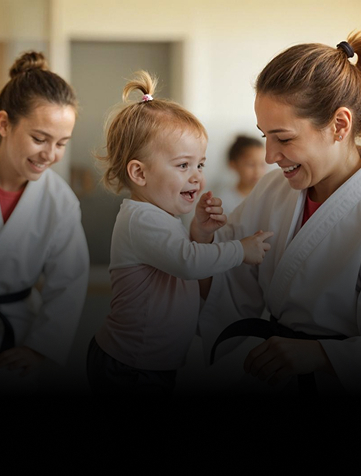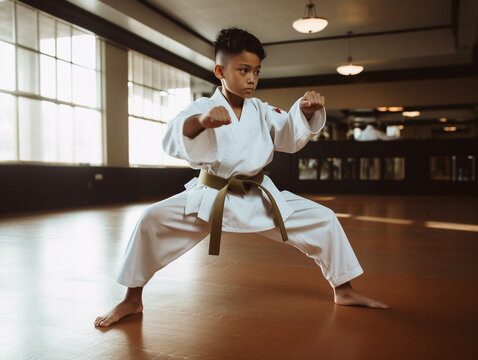How Martial Arts for Children Can Increase Self-confidence and Discipline in Youthful Martial Artists
Karate for youngsters offers an unique chance to build self-confidence and self-control in young martial artists. As they learn brand-new strategies and face challenges, they not only get abilities but also establish a solid feeling of self-regard. This structured atmosphere urges them to respect the trip of renovation. Exactly how does this training equate right into their daily lives? Discover the much deeper links that make karate even more than simply a sporting activity.
The Relevance of Self-confidence in Childhood Development
Confidence is a crucial foundation in childhood years development. When you nurture your kid's self-confidence, you equip them to encounter challenges, take threats, and share themselves openly. Kids with self-confidence are more happy to explore new tasks and social scenarios, which can lead to lasting relationships and beneficial experiences.Encouraging your kid to get out of their comfort zone cultivates strength. They discover that failure isn't completion however rather a tipping rock to success. By commemorating their accomplishments, despite how tiny, you help them recognize their capacities and worth.In this trip, assistance and positive reinforcement from you play an important function. Whether it's through praise or simply being existing, your participation boosts their confidence. As they grow, this self-assurance becomes a lifelong possession, outfitting them to browse both difficulties and opportunities with a strong feeling of self.
Exactly How Karate Shows Discipline and Emphasis
Karate aids you construct discipline and emphasis through its organized training program. As you exercise mindfulness during each session, you'll find out to concentrate far better both on and off the mat. And also, setting and achieving goals in martial arts reinforces your capacity to stay attentive and dedicated.
Structured Training Routine
While you take part in karate training, you'll promptly discover just how a structured routine imparts technique and focus in young practitioners. Each course follows a specific style, consisting of workouts, method method, and sparring. This consistency educates you to respect the process and dedicate to renovation. As you find out forms and techniques, you establish a feeling of responsibility for your own progress.The organized environment encourages you to set goals, whether grasping a brand-new belt or perfecting a kata. You'll discover that remaining concentrated throughout classes and drills sharpens your concentration. The self-control you grow in martial arts extends beyond the dojo, favorably influencing your schoolwork and day-to-day regimens. Each session reinforces the significance of commitment, aiding you expand right into an extra self-displined individual.
Mindfulness in Technique
As you exercise karate, you'll find that mindfulness ends up being a necessary component of your training. Each action requires your full attention, assisting you stay concentrated on today moment. You'll learn to tune out interruptions and concentrate on your breathing, motions, and intents. This increased understanding hones your reflexes and enhances your discipline.During sparring or forms, you'll uncover the relevance of being emotionally existing - Karate Salisbury MD. You'll discover how this emphasis not just enhances your technique yet also builds your self-confidence. By exercising mindfulness in karate, you cultivate patience and strength, important characteristics that extend past the dojo. This way, karate teaches you to harness your mind, aiding you create a regimented method to challenges both on and off the floor covering

Personal Goal Setting Techniques
Setting objectives in martial arts isn't just regarding gaining belts; it's a powerful method to grow discipline and emphasis. When you establish specific, attainable targets, you develop a roadmap for your progress. As an example, rather of just intending to boost your kicks, attempt concentrating on grasping a certain technique monthly. This method maintains you determined and engaged.Breaking down bigger goals into smaller, convenient steps helps you track your development and celebrate tiny triumphes in the process. Whether it's improving your position or raising your sparring endurance, every goal reinforces your commitment. As you accomplish these objectives, you'll construct self-confidence in your skills and establish a strong feeling of technique that extends beyond the dojo into day-to-day life.
Structure Durability Via Martial Arts
Martial arts, especially martial arts, provides youngsters an unique chance to construct resilience in a helpful setting. In classes, they deal with difficulties that push their limitations, whether it's mastering a new strategy or competing with a partner. Each setback, like a missed out on kick or a shed match, ends up being a possibility to find out and grow.As they exercise, youngsters discover to embrace pain and maintain trying, also when things obtain tough. They discover that failure isn't the end; it becomes part of the journey. This attitude helps them jump back more powerful, not simply in the dojo, yet in day-to-day life.With this contact form each obstacle they get rid of, your youngster constructs confidence in their capacity to deal with barriers, sustaining their resolution. Via karate, they'll comprehend that durability isn't almost physical toughness; it's regarding mental grit and perseverance, empowering them to deal with whatever life throws their way.
The Role of Regard in Karate Training
Regard is a fundamental principle in karate training, fostering a culture of self-control and sociability among students. When you step onto the dojo flooring, you're not just finding out methods; you're also finding out to respect your trainers, peers, and the art itself (Karate Salisbury MD). Bowing at the beginning and end of class isn't simply a procedure; it symbolizes your acknowledgment of others' dedication.as and initiatives you develop mutual respect, you'll find it boosts your knowing experience. You'll pay attention much more diligently to your teacher and gain insights from fellow students. This environment encourages useful criticism and support, enabling everyone to expand together.Moreover, regard cultivates self-discipline. Acknowledging the value of effort and humbleness helps you stay concentrated on your training. Subsequently, this respect equates into your day-to-day life, improving your interactions and connections outside the dojo. Through karate, you discover that regard is important for individual growth and neighborhood building
Achieving and establishing objectives Success in Karate

Social Skills and Synergy in the Dojo
While training in the dojo, kids normally create vital social skills and teamwork capacities. As they practice together with peers, they discover to interact effectively, share area, and support one another. Each class offers chances for partnership, whether it's during partner drills or group exercises. This synergy promotes friendships and creates a feeling of belonging, making the dojo a nurturing environment.Kids additionally get beneficial problem resolution skills. When they encounter difficulties, such as disagreements during sparring, they learn to navigate these scenarios constructively. They exercise persistence and compassion, recognizing that everyone has different staminas and weaknesses.Moreover, taking part in team tasks cultivates a feeling of responsibility. You'll see your child discovering to rely upon colleagues and take responsibility for their duty in a team. These experiences not just enhance their martial arts trip however likewise outfit them with social tools they'll bring right these details into various other areas of life.

The Long-Term Perks of Martial Arts Beyond Childhood
As kids mature and change right into their adult years, the benefits of karate extend far past the dojo. You'll discover that the discipline and focus found out via martial arts can translate into your scholastic and expert life. Establishing and attaining goals in martial arts cultivates a strong job principles, which can press you to succeed in any kind of endeavor.Moreover, the self-confidence acquired from understanding techniques and competing can enhance your self-worth, assisting you deal with challenges head-on. This strength becomes important as you encounter the uncertainties of adulthood.Additionally, the social skills created via teamwork and friendship in the dojo can cause much better connections in both professional and individual balls. You'll discover to connect effectively, resolve pop over to this web-site problems, and construct a helpful network.Ultimately, karate forms not simply skilled martial artists, however well-rounded people prepared to take on the globe.
Often Asked Concerns
What Age Is Best to Begin Karate for Children?
You can start martial arts as very early as age four or five, but it frequently depends on your youngster's maturity and rate of interest. Locating a class that fits their age and power degree makes a huge difference.
Are There Any Type Of Wellness Advantages From Exercising Karate?
Yes, exercising karate offers many health and wellness benefits. You'll boost your toughness, flexibility, and control while enhancing cardio health and fitness. And also, it improves emphasis and psychological health, making it an amazing selection for overall physical and mental health and wellness.
Just How Often Should Kids Go To Martial Arts Courses?
You need to urge your kids to attend karate classes at least 2 to 3 times a week. Uniformity aids them find out strategies properly and develop skills, making their experience more delightful and fulfilling in the future.
Can Karate Aid With Managing Anxiety in Children?
Yes, karate can assist take care of anxiety in children. It shows emphasis and self-control while offering a risk-free electrical outlet for power. You'll observe your youngster expanding a lot more tranquil and certain as they exercise regularly.
What Equipment Is Required for Kids Starting Karate?
